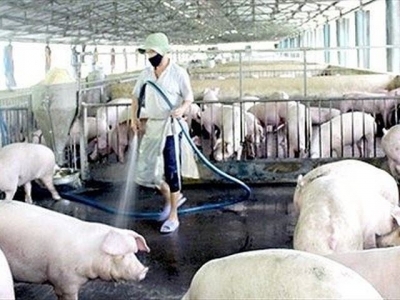Vietnamese farmers expect higher profits with CPTPP trade agreement

The Comprehensive and Progressive Agreement for Trans-Pacific Partnership (CPTPP) is expected to help Vietnam boost exports of seafood and farm produce.
Animal husbandry will have to compete fiercely with imports from CPTPP countries
At least $40 billion worth of export turnover from farm produce in 2018 is within reach, some experts believe.
Nguyen Do Anh Tuan, director of the Institute of Policy and Strategy for Agriculture and Rural Development, said that with CPTPP (which is essentially the old TPP without the US), Vietnamese farmers will receive benefits because technical barriers and requirements on imports are not as high compared with the former TPP that included US participation.
Vietnam’s farm produce export turnover was $36 billion last year. A $40 billion export turnover is quite within reach this year, though farmers have higher expectations
Tuan believes that Vietnam’s wooden furniture, seafood, coffee, pepper, cashew nut and rice products will have better opportunities to enter Australia, Canada, Mexico and Japan.
However, animal husbandry will have to compete with imports from CTPP countries, especially beef, pork, chicken and dairy products, because of the tariff removal.
FTAs facilitate trade liberalization with tariff removals. However, tariff barriers are still used by member countries to protect some of their important business fields. Japan, for example, wants to protect its rice production, while Latin American countries want to ‘play for time’ in opening rice and fruit markets.
“We are ready for a field in which there are many big players and we have to follow the rules of the game,” Tuan said.
Minister of Agriculture Nguyen Xuan Cuong said that Vietnam’s farm produce is exported to 180 countries and territories. With the CPTPP, Vietnam would have a large market with 500 million consumers and 14 percent of the global GDP.
“Vietnam’s farm produce export turnover was $36 billion last year. A $40 billion export turnover is quite within reach this year, though farmers have higher expectations,” Cuong said.
Do Ha Nam, chair of Intimex, one of the largest Vietnamese farm produce exporters, is optimistic about Vietnam’s produce exports in the CPTPP period, saying that Vietnam has no match among CPTPP members in the field.
Vietnam exports mostly raw farm produce. Processed products such as instant coffee and cashew nuts bear high tax rates of 20-40 percent. But in the future, when the tariff is cut to zero percent, Vietnamese enterprises will focus on making processed products rather than raw materials to earn more money.
Tran Van Linh, chair of Thuan Phuoc Seafood & Trade, however, was cautious when talking about the benefits of the CPTPP.
He said Vietnamese enterprises will be able to benefit from the tax cuts, but “this will not be too much”. “Once the tariff is cut to zero percent, foreign importers will surely force the prices down,” he explained.
Có thể bạn quan tâm
 Vietnam aims for 6.5 million tons of rice exports
Vietnam aims for 6.5 million tons of rice exports Vietnam set the target of exporting 6.5 million tons of rice, said Vice Minister of Agricultural and Rural Development Ha Cong Tuan to Vietnam News Agency.
 Vietnam gains positive signals in agricultural exports
Vietnam gains positive signals in agricultural exports Positive signals in agricultural exports are premise and impetus for the agricultural sector to fulfil preset norms.
 Vietnam targets $4.5 billion from farm produce exports by 2020
Vietnam targets $4.5 billion from farm produce exports by 2020 Vietnam’s fruit and vegetable exports are expected to top 4.5 billion USD by 2020, with fruits accounting for 3.6 billion USD